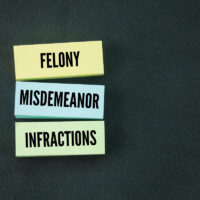Recent Blog Posts

What Is the Exclusionary Rule in Criminal Cases?
When police investigate a crime, they must follow strict constitutional rules. If law enforcement officers violate those rules while gathering evidence, that evidence may not be used against the accused in court. This principle is known as the exclusionary rule, and it plays a central role in protecting individual rights in California criminal cases…. Read More »

Defending Against Drug Possession vs. Drug Sales Charges in California
Drug-related charges in California are not all treated the same. One of the most important distinctions prosecutors make is whether a case involves simple possession of a controlled substance or possession for sale/drug sales. That difference can dramatically affect potential penalties, jail or prison exposure, and long-term consequences on your criminal record. Understanding how… Read More »

Potential Defenses Against California DUI Charges
Being arrested for driving under the influence (DUI) can be one of the most stressful experiences a person faces. A conviction can lead to steep fines, driver’s license suspension, mandatory DUI classes, probation, and even jail time—consequences that can affect employment, finances, and personal freedom. But a DUI charge is not the same as… Read More »

Probable Cause vs. Reasonable Suspicion: What Do They Mean and When Do They Apply?
When police stop, search, or arrest someone, their actions must be supported by a lawful justification. Two of the most important legal standards governing police conduct are “probable cause” and “reasonable suspicion.” Although these terms are often used interchangeably in casual conversation, they carry distinct meanings and apply in different situations. Understanding the difference… Read More »

What Is “Search and Seizure,” and What Are My Rights?
One of the most important protections in the U.S. Constitution is the right to be free from unreasonable searches and seizures. The Fourth Amendment limits the power of law enforcement to intrude into your private life without justification, and California courts take those protections seriously. Yet, many people are uncertain about what those rights… Read More »

What if the Police Didn’t Read Me My Rights?
If you’ve ever watched a police drama on television, you’ve likely heard the familiar phrase: “You have the right to remain silent. If you give up the right to remain silent, anything you say can and will be used against you in a court of law…” This is known as the Miranda warning, and… Read More »

What Is the Difference Between a Misdemeanor and a Felony in California?
If you’ve been arrested or charged with a crime in California, one of the first issues you’ll want to understand is whether the offense is classified as a misdemeanor or a felony. Understanding the distinction is critical, both for knowing what you’re up against and for preparing a proper defense. The classification of a… Read More »

What Is Veterans Treatment Court?
Veterans Treatment Court (VTC) is a specialized collaborative justice program designed to address the underlying service‑related causes of veterans’ encounters with the criminal justice system, such as post-traumatic stress disorder (PTSD), traumatic brain injury (TBI), military sexual trauma, substance use disorders, or other mental health challenges. Rather than relying solely on punishment, these courts… Read More »

New California Law Closes ‘Locked Door Loophole’ in Vehicle Theft Cases
In a significant move to combat rising property crimes, California enacted Senate Bill 905 (SB 905) last year, effectively closing the so-called “locked door loophole” in vehicle theft cases. This legislative change, which went into effect at the start of the year, has substantial implications for individuals accused of theft from vehicles, making it… Read More »

New Law Imposes Harsher Penalties for Shoplifting and Drug Possession in California
On November 5, 2024, California voters approved Proposition 36, the “Homelessness, Drug Addiction, and Theft Reduction Act,” introducing significant changes to the state’s criminal justice system, particularly concerning drug and theft-related offenses. The implications of this new law, which went into effect on December 18, 2024, for individuals facing such charges make it more… Read More »
